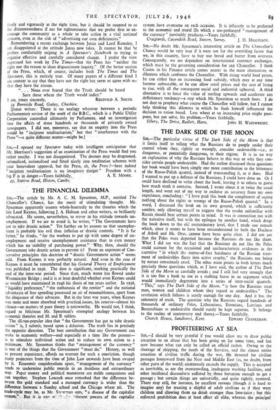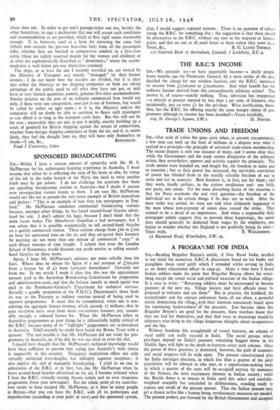PROFITEERING AT SEA .
Sris,—I should be very grateful if you would allow me to draw public attention to an abuse that has been going on for some time, and has now become what can only be called an official racket. Owing to the shortage of shipping, the needs of the Services, and the almost entire cessation of civilian traffic during the war, the demand for civilian passages homeward from the Near and Middle East (as, no doubt, from other parts of the world) enormously exceeds the supply. This is accepted as inevitable, as are the overcrowding, inadequate washing facilities, and other incidental discomforts suffered by those fortunate enough to get a passage ; but certain things are universally, and quite rightly, resented. There may still, for instance, be excellent reasons (though it is hard to imagine any) for treating a shipful of adult civilians as if they were children and allowing them no drink stronger than lime-juice ; but this enforced prohibition does at least affect all alike, whereas .the principal abuse does not. In order to get one's passage-ticket one has, besides the other formalities, to sign a declaration that one will accept such conditions and accommodation as are provided, which at ,first sight seems reasonable enough. It is, however, used as a lever for 'extorting the same fare (which now exceeds the pre-war first-class fare) from all the passengers alike, whether they are berthed in comparative cdmfort in a first-class cabin (these are rightly reserved mainly for the women and children) or in what are euphemistically described as " dormitories," where the accom- modation is well below pre-war third-class standard.
The ships, or at least the one I recently travelled on, are owned by the Ministry of Transport and merely " managed " by their former owners ; I do not know how the receipts are divided, but it is clear that either the Ministry or the shipping companies or both are taking advantage of the public need to sell what they have not got, or only have in very limited quantities, namely, genuine first-Class accommodation. Similar practice on the part of an ordinary commercial firm would not only, if there were any competition, soon put it out of business, but would be called by rather an ugly name ; as it is, the Ministry and/or the companies will no doubt be able to continue to fleece such passengers as can afford it so long as the transport crisis lasts. But this will not be for ever ; meanwhile they are not, to put it mildly, exactly building up a stock of goodwill for British shipping against the return of competition, whether from foreign shipping companies or from the air, and if, as seems likely, they feel the draught later on, they will have only themselves to































 Previous page
Previous page